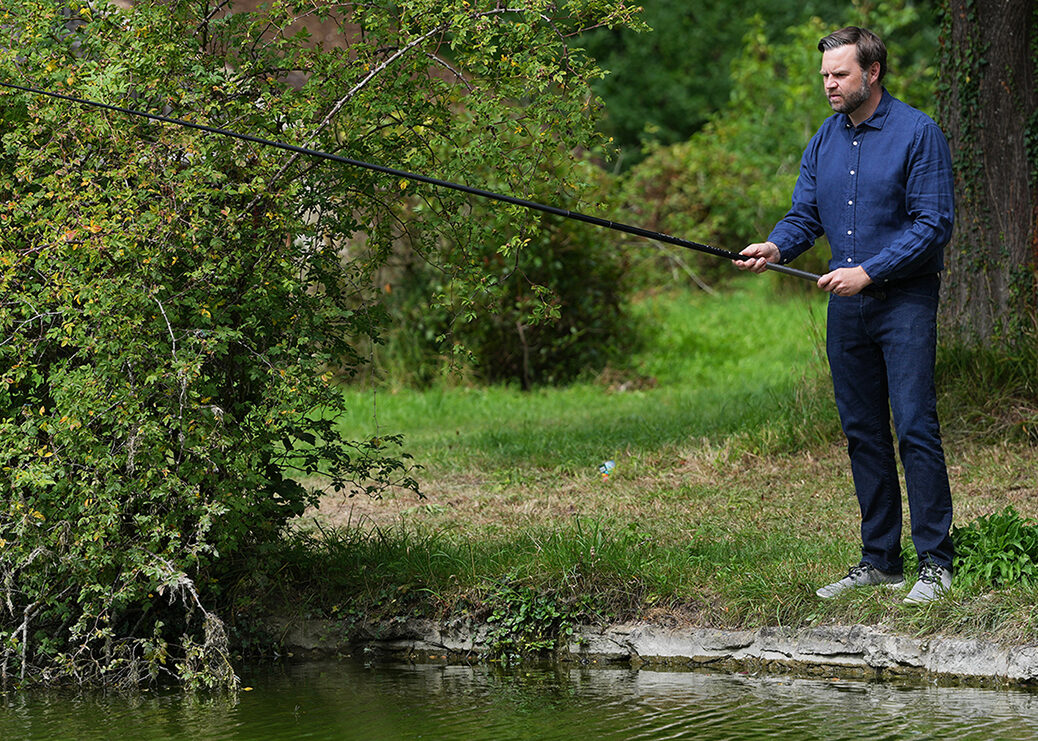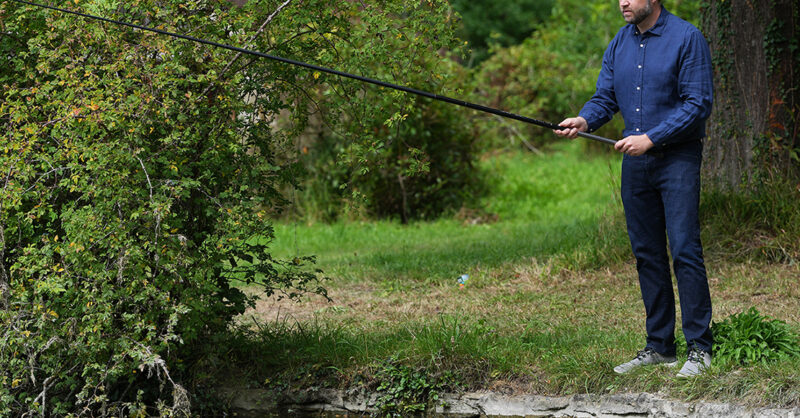
Photo by Kin Cheung/Getty Images
JD Vance is the most underestimated man in Washington. Memes of him with a cartoonishly fat face populate the internet. A recent South Park episode had Donald Trump shouting at a tiny Vance “Will you get out of here?!” and kicking him off screen. The news that he was turned away from The Bull pub in Oxfordshire this week following a staff mutiny was gleefully reported by American media. Democrats sneer that he is nothing more than a drooling dauphin, simpering and slavish.
Vance is certainly going along with Trump’s conceits in order to inherit the throne. But this narrative misses that JD Vance is already the prince of the Western right. His trip to England was the surest proof yet that Vance’s constituency isn’t just to be found in Washington or Ohio – but across the influencers and intellectuals of a tightly bound and unusually loyal transnational reactionary movement.
This summer Vance held court in an English 18th-century manor, a forward operating base in his campaign to Maga-ify the British right. Part of his itinerary was set up by the slick Cambridge theologian James Orr and the podcasting former chancellor George Osborne. The less well-known Orr used to do Jordan Peterson’s scheduling during his tours of British university campuses. Orr also serves as a Vance interpreter, having been quoted in the Times that Vance has a “special concern” for the UK. Vance’s criticism of the British government, particularly over its backsliding on free speech, seems grounded in a paternal feeling for America’s errant ward. For these precious weeks Vance has come in-person, here to help guide the country onto stronger ground.
The line between what counts as an official trip and a family holiday has blurred under Trump’s administration. One of Vance’s first “official” trips was to the Vatican – where Vance, a Catholic convert, met Pope Francis – and to India with his family, the birthplace of his wife’s parents. Meanwhile, the president invites world leaders to attend to him at his Scottish golf course. Informality takes precedence over diplomatic protocol. But while Trump invited Keir Starmer and Ursula Von der Leyen to Turnberry, Vance can look to the future. His guestlist showed he is interested in a new generation, one which will be ushered in under his tutelage.
On 11 August, Vance hosted a small reception, organised by Osborne. Four Conservative MPs were there, all relatively young, and none the party leader: Robert Jenrick, Laura Trott, Chris Philp and Katie Lam, who recently clocked nearly one million views on X with a video illustrating mass migration with a jar overflowing with beads. Kemi Badenoch and Vance insisted diary clashes explain her absence.
Under normal circumstances, you’d think someone who wants to be prime minister would make a trip to see the person most likely to be the next president of the United States. On 13 August, the vice-president instead met the person most likely to be the next prime minister. He hosted Nigel Farage for a one-on-one breakfast which Farage described to the Telegraph as “two old friends meeting with many, many common interests. After all, I’ve been the longest public supporter of Maga in Britain.”
Despite this “old” friendship, Farage is not a recipient of the ultimate honour: the only one of these political guests Vance follows on his X account is Robert Jenrick. And Vance’s online habits have taken to even more unexpected corners of British internet culture. He also follows Thomas Skinner, the former Apprentice candidate and self-made English influencer known for his catchphrase “bosh”. Skinner was a guest at the manor for a barbecue on the evening of 10 August, alongside Orr and the Tory MP Danny Kruger. This is unusual. Imagine Dick Cheney eating ribs with David Davis, Ann Widdecombe, Robert Kilroy-Silk, and a young Michael Gove at a rented cottage in Salcombe.
Subscribe to The New Statesman today from only £8.99 per month
Vance once said that Kruger’s 2023 book on Britain, Covenant, has “lessons for all of us who love the civilization built by our ancestors”. In a fragment, here is Vance’s conflicted affection for England. The view that the ancestral home has been wrecked by liberal progressivism and mass immigration is a common thread in Maga. Steve Bannon once remarked to me: “It’s so pathetic, England. God, I love England – it’s so fucked up”. In a column for the Wall Street Journal to mark Vance’s visit, Orr claimed that the “historical heuristic for our [Britain’s] national unwinding is Beirut 1975”. That’s a soft, almost cryptic way of saying that Britain is heading for a civil war fought along ethno-religious lines.
This sense that Britain needs radical reform is what explains Vance’s guestlist. Jenrick not only shares a physiognomy – a stout moon-shaped face, topped with closely cropped dark hair – with Vance (at least before Jenrick’s Ozempic glow-up); both men have moved gradually but decidedly from liberal conservatism to the radical right, fuelled by civilisational angst at the extraordinary number of migrants who have arrived in Europe and America in recent decades. Another term for their beliefs is national conservatism. And it’s not just a belief system: “national conservatism” might be seen as a byword for this network of individuals, one which can unite theological grandees, international statesmen – and ambitious politicians.
The same network of ideas and influence will be on display in Washington DC in September when the National Conservative Conference will take place. This is the sixth annual gathering, the brainchild of the American-Israeli political thinker Yoram Hazony. Vance, the Secretary of State Marco Rubio and the Trump adviser Stephen Miller have all attended in the past. The conferences are organised by Hazony’s Edmund Burke Foundation, who have a UK branch, chaired by none other than Orr. Hazony recently told the New York Times that National Conservatism distinguishes itself in two directions: from the libertarians in the Republican Party to their left and the racist and anti-democratic figures to their right. Farage, who is listed as a conference speaker, has long said something similar about creating a wall between himself and people such as Tommy Robinson.
Yet there are other speakers far to the right of most on Vance’s guestlist: Jeremy Carl, the man trying to revive white identity politics; Jack Posobiec, a Bannon ally who once called for the overthrow of democracy; Jonathan Keeperman, an influential figure on the online right who runs Passage Press, a publishing company that prints forgotten books by reactionary authors (Ernst Jünger, HP Lovecraft) alongside contemporary writers popular with Maga intellectuals (Curtis Yarvin, Steve Sailer). One forthcoming NatCon panel will discuss how to overturn the Supreme Court ruling which legalised gay marriage in America.
Does the British right have anything useful to learn from this crew? Apart from one Farage foray into abortion rights, the social issues that rivet America have little grasp in the UK. And while Skinner might like to tweet occasionally about going to church, the Catholicism of Vance and his political allies is dedicated and doctrinaire. As Ross Douthat, the Catholic New York Times columnist who interviewed Vance at the Vatican in May, told me, “If you’re going to be a Christian in the intelligentsia, it feels like Catholicism or nothing.” A paradox of American secularism is that religion is also a font of political philosophy.
That is not the case in Westminster. Kruger’s evangelical Christianity is unusual in parliament. But outside the Commons, perhaps the most influential evangelical is Paul Marshall, the owner of the Spectator and co-owner of GB News. Marshall met Vance on 12 August. Yet few in England would cite the Archbishop of Canterbury as a political inspiration. Roger Scruton plays the role of in-house philosopher for British conservatives much more than Pope Benedict XVI.
But religiosity is not a precondition for national conservatism. English national conservatism will always be couched in English culture. Progressives’ adoption of woke politics, exemplified by the Black Lives Matter protests in 2020, was the last significant American political import into Britain. Is Vance leading what could be the next?
There is no JD Vance analogue in the country. But this son of Scots-Irish America is assembling the English shards of himself, from the religious intellectual pondering integralism, to the Essex hillbilly with the common touch. National conservatism has the inventory to hand a wily politician both a populist playbook and at the same time an elite intellectual hinterland to serve as a guiding philosophy. One suspects Vance dished out some advice to his guests while in the Cotswolds on how to use this very modern synthesis to fuel Britain with the same forces he and Trump are using to reshape America.
[See also: The Cotswolds plot against JD Vance]
Content from our partners

